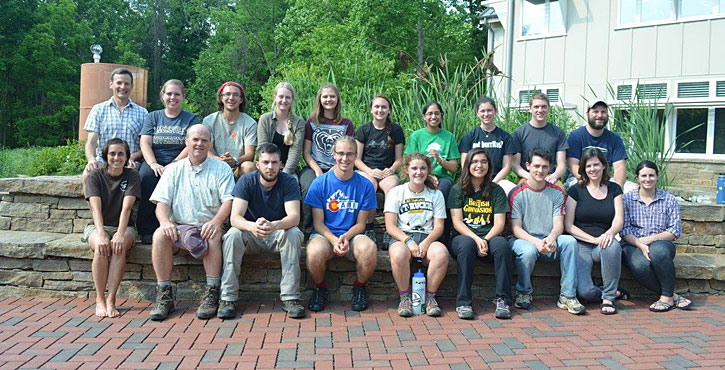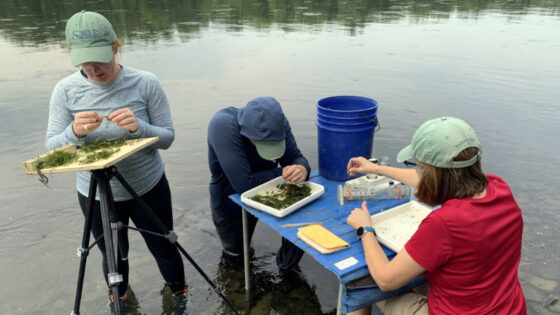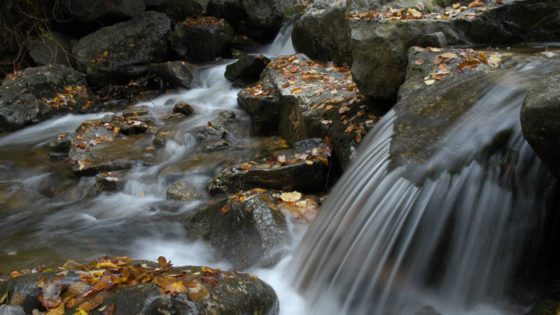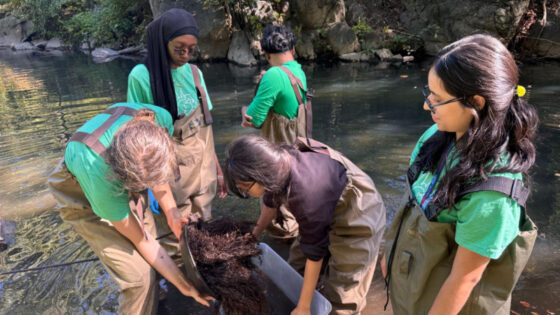Each summer, Stroud Water Research Center welcomes a new group of interns who are eager to participate in research projects and to begin what may become their life’s work — a career in the sciences. Our internship program, now in its 44th year, has ushered through hundreds of interns who have come in search of meaningful work.
The summer internship experience allows undergraduates to see for themselves if they have the passion and fortitude to sustain themselves during the challenges inherent in research. The Stroud Center also benefits from the program.
“This program is clearly a win-win for everyone involved. We’re able to expand the depth and breadth of our research programs and cultivate great talent at the same time,” said Director Bern Sweeney. “Each year several of our interns return — and we’ve had the good fortune to recruit some of our best employees directly from the internship program.”
Gaining Skills Critical for a Career in Science
As they immerse themselves in their research projects, the interns also benefit from lectures presented by Stroud Center senior scientists, and they participate in a journal club, where they read and discuss original research articles published in scientific journals.
By summer’s end, these interns will have gained enough knowledge and confidence to present their own scientific research, both to their peers and to the general public, about a specific scientific topic or their own research — an exercise designed to test their understanding of the subject, to educate others, and to give them a taste of what will be expected in their future studies and as independent researchers.
We welcome the following interns to our research and watershed restoration groups.
- Entomology Group: Alaina Bertoline, West Chester University; Luke Frankel, Bowdoin College; Trevor Hall, University of Delaware; Garrett Hoover, West Chester University; Amy Kochel, Juniata College; Tom Oranzi, Penn State; Maria Scarborough, Great Valley State University; Jacqueline Smiler, Ursinus College; Jenna Waite, Millersville University; Kelli Williams, Lynchburg College
- Fluvial Geomorphology Group: Ben Tumolo, Montana State University; Katie Hughes, McDaniel College
- Organic Biogeochemistry Group: Kwan Jin, West Chester University
- Watershed Restoration Group: Calen Wylie, Millersville University; Matt Gisondi, Philadelphia University; Joe Receveur, Millersville University
Critical Zone Observatory Research Experience for Undergraduates and Teachers

In addition to the 16 interns listed above, another six undergraduates are participating in the National Science Foundation-funded Critical Zone Observatory Research Experience for Undergraduates (REU) and Teachers (RET) at the Stroud Center and the University of Delaware. The REUs work alongside scientists to study the Critical Zone, loosely described as where rock meets life, extending from the tops of trees into the depths of groundwater.
The CZO REU/RET program also includes two teachers working on research projects at the Stroud Center and developing related curricula to use when they return to their classrooms.
The Stroud Center partners with the Pennsylvania State University for the program — they are hosting an additional eight undergraduates and one teacher at their Susquehanna Shale Hills CZO site.
CZO Undergraduate Interns
- Nate Watson (Cornell University) and Emma Gibson (Missouri State University) are working with Melinda Daniels, Ph.D., principal investigator of the Fluvial Geomorphology Group
- Peter Wise (Goshen College) is working with Anthony Aufdenkampe, Ph.D., principal investigator of the Organic Geochemistry Group
- Kathleen Fisher (Villanova University) is working with Jinjun Kan, Ph.D., principal investigator of the Microbiology Group
- Riley Brown (California State Polytechnic University) and Cate Medlock (University of Delaware), are working with Holly Michaels, Ph.D, Associate Professor, Department of Geological Sciences, University of Delaware
CZO Teacher Interns
- Dan Bondanza (Sun Valley High School) is working with David Arscott, Ph.D., and Anthony Aufdenkampe, Ph.D., on EnviroDIY, the Stroud Center’s online community for do-it-yourself environmental science and monitoring
- Jill Dunscomb (Bayard Rustin High School) is working with Steve Kerlin, Ph.D., and Tara Muenz, director and assistant director of education, respectively, and the Watershed Restoration Group
CZO REU/RET Completed Research
This is the third year for the CZO REU/RET program at the Stroud Center and Penn State. See the completed research and curricular materials.



